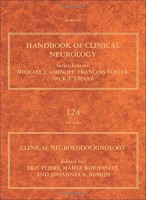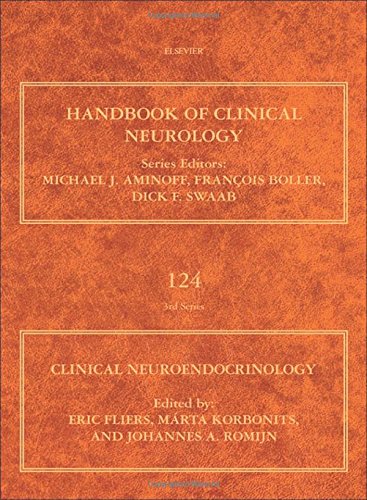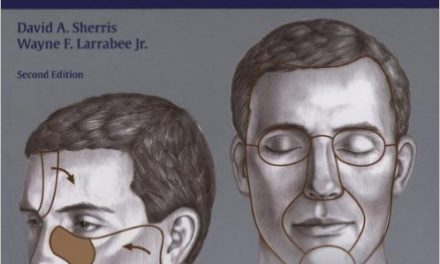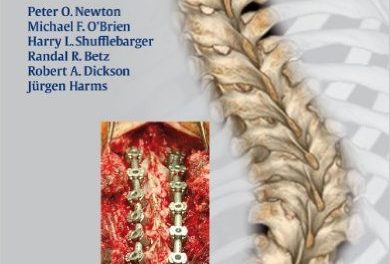 Series Editors: Michael J. Aminoff, Francois Boller, and Dick F. Swaab
Series Editors: Michael J. Aminoff, Francois Boller, and Dick F. Swaab
Volume Editors: Eric Fliers, Marta Karbonits, and Johannes A. Romijn
Publisher: Elsevier – 432 pages
Book Review by: Nano Khilnani
What is the focus of clinical neuroendocrinology? This medical specialty focuses mainly on the pathophysiology, diagnosis, and the treatment of diseases of the hypothalamus and the pituitary glands, two small organs located at the base of the human brain. To some extent, it also deals with the thyroid gland, because there is a hypothalamus-pituitary-thyroid (HPT) relationship in this field.
Much progress has been made in neuroendocrinology in recent years, for example:
- Discovery of leptin and its role in body weight regulation and metabolism
- Identification of novel genetic causes of pituitary tumors, central hypothyroidism, and hypogonadism
- Recognition of oxytocin and vasopressin’s roles in social behaviors
- Discovery of medicines effectively reducing the excessive endocrine activity of selected pituitary tumors
This volume explains the general functions of these two glands, their common and not-so-common disorders, and some of the controversies surrounding them. The outline below gives you a broad perspective of what you will find in the book, and many details:
I. Clinical aspects of hypothalamic function
Development
- Genetic aspects of hypothalamic and pituitary gland development
- Neuroendocrinology of pregnancy and parturition
Vasopressin, oxytocin, corticotrophin-releasing hormone
- Disorders of water metabolism: diabetes insipidus and the syndrome of inappropriate anti-diuretic hormone secretion
- The role of oxytocin and vasopressin in emotional and social behaviors
- Cortricotrophin-releasing hormone and the hypothalamic-pituitary-adrenal axis in psychiatric disease
Metabolism
- Genetic aspects of human obesity
- Sleep characteristics and insulin sensitivity in humans
- Hypothalamic-pituitary hormones during critical illness: a dynamic neuroendocrine response
- Central regulation of the hypothalamo-pituitary-thyroid (HPT) axis: focus on clinical aspects
II. Disorders of the pituitary gland
Diagnostic approach
- Evaluation of pituitary function
- Imaging of pituitary pathology
Pituitary pathologies
- Nonfunctioning pituitary tumors
- Hyperprolactinemia and prolactinoma
- Acromegaly
- Cushing’s disease
- Cranopharyngiona
- Rathke’s cleft cyst
- Alternative causes of hypopitiutarism: traumatic brain injury, cranial irradiation, and infections
Therapeutic approach to pituitary tumors
- Surgical approach to pituitary tumors
- Medical approach to pituitary tumors
- Radiation therapy in the management of pituitary adenomas
Controversial issues and hot topics
- Nelson syndrome: definition and management
- Familial pituitary tumors
- Long-term effects of treatment of pituitary adenomas
- Neuroendocrine mechanism in athletes
- Uncertainties in endocrine substitution therapy for central hypocortisolism
- Uncertainties in endocrine substitution therapy for central insufficiencies: hypothyroidism
- Uncertainties in endocrine substitution therapy for central insufficiencies: growth hormone deficiency
- Autoimmune hypophysitis: new developments
Clinical neuroendocrinology involves the integration of a number of medical fields with neurology, including clinical genetics, internal medicine, pediatrics, neuroradiology, neurosurgery, radiotherapy. So this book also looks at the behavioral consequences of disorders and therapies, uncertainties in therapy, and controversies and recent novel insights recent research.
Editors:
Eric Fliers is Professor of Endocrinology at the Academic Medical Center of the University of Amsterdam, where he serves as the Head of the Department of Endocrinology and Metabolism. He is the current chair of the Dutch Endocrine Society. He has his roots in research in neuroendocrine nuclei in the postmortem human hypothalamus, and was involved in the foundation of the Netherlands Brain Bank. His current research is focused on neuroendocrine aspects of the HPT axis.
Marta Karbonits is Professor of Endocrinology and Metabolism at Barts and the London School of Medicine and Dentistry, Queen Mary University of London, where she heads the Centre for Endocrinology. With the help of the Familial Isolated Pituitary Adenomas (FIPA) consortium, she is currently defining the clinical characteristics of patients with familial pituitary adenoma syndromes and uncovering novel genetic variants causing these conditions.
Johannes A. Romijn is Professor of Medicine at the Academic Medical Center at the University of Amsterdam and serves as chair of the Department of Medicine. He is the Editor-in-Chief of the European Journal of Endocrinology. His research has a main focus on neuroendocrine regulation of metabolism.







